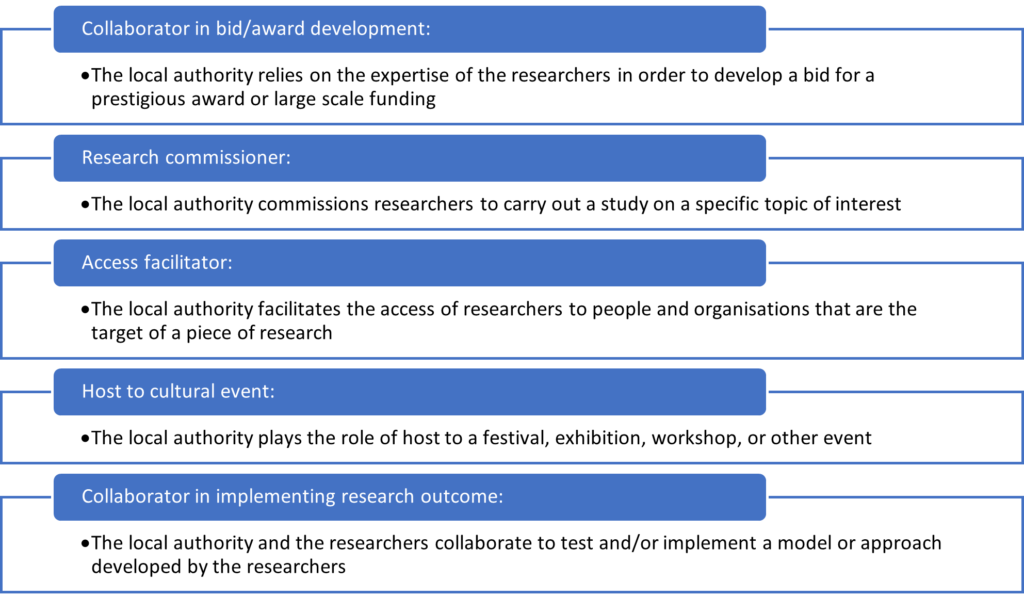Anecdotal evidence suggests that there are many potential avenues for the involvement of Local Authorities in cultural initiatives – for example, as funders, clients, hosts, collaborators. Yet, the here have been, so far, very few analyses of the role of Local Authorities in cultural knowledge exchange. In a recent short report for the National Centre for Academic and Cultural Exchange (NCACE), Dr Federica Rossi investigates what roles local authorities play in cultural knowledge exchange between Higher Education Institutions (HEIs) and other societal actors.
Focusing on the 59 cases submitted to Panel D, Arts and Humanities, which involve local authorities among the formal partners, the report examines:
- The type of collaborations that local authorities are involved in: which HEIs submit cases involving local authorities in cultural knowledge exchange? Which other organisations are involved in these cases? Who funds these collaborations?
- The type of impact that collaborations involving local authorities in cultural knowledge exchange generate.
The 59 cases submitted to panel D involve 102 different local authorities; most of these are involved in only one case study, but some of them are involved in two or three. The report finds that local authorities collaborate in cultural knowledge exchange either with highly research intensive HEIs that enjoy a reputation of research excellence, also internationally, or with HEIs that are more oriented towards training local students and often appear to have a network of local relationships. They also collaborate with several small specialist arts institutions.
Types of Collaborations Involving Local Authorities
Local authorities are involved in a variety of forms of research collaborations. When they are mentioned as formal partners in the collaborations, they do not usually fund these collaborations but take on other roles, which we have described as being:

More research-intensive collaborations (where the local authority is involved closely as partner of the HEI, or when it commissions the researcher to produce a study or object) are more likely to occur when the partner is a research-intensive, ‘Russell Group’ university. Instead, collaborations where the local authority plays another role, such as hosting an activity, or collaborating on a bid, are equally likely to involve research-intensive or more teaching-oriented universities.
Challenges and Opportunities for Local Authorities
The role of the local authority is often not described very clearly, and has to be inferred from reading the documents; when described, it is presented only in the details of the impact section. This could indicate that often the HEIs do not perceive local authorities as key partners, particularly when their role is that of helping the researchers to gain access to specific research targets, or when they organise activities which the researchers contributed to. Perhaps local authorities may improve their effectiveness in collaborating with researchers so that their contribution is more readily acknowledged; and that there may be other, currently underexploited, avenues for collaboration between HEIs and local authorities in cultural knowledge exchange.
The short report is part of a broader collection of short essays on Local Authorities and culture-based partnerships.
Rossi, F. (2024) Local authorities and cultural knowledge exchange between HEIs and other societal actors: an analysis of REF 2021 impact case studies, in “Universities, Local Authorities and Culture-based Partnerships: Case studies, reflections and evidence from REF impact case studies”, NCACE, 2024

